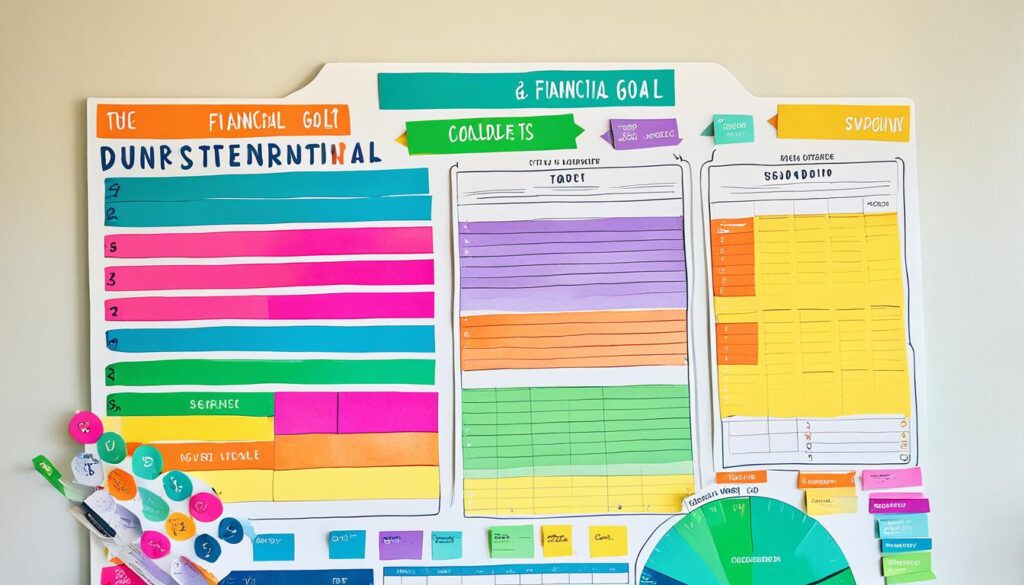Stay Accountable to Financial Goals – Learn How!

Do you ever feel like your financial goals are slipping away? You have the intentions, but somehow you always seem to fall short? It’s time to ask yourself, what is a way to stay accountable to reaching your financial goals? Tracking your progress and implementing accountability strategies can make all the difference.
When it comes to your financial future, staying on track is crucial. But how do you make sure you don’t lose sight of your goals? How can you hold yourself accountable in a way that keeps you motivated and focused? Let’s dive into some effective strategies that will help you stay accountable to reaching your financial goals.
Key Takeaways:
- Setting short-term goals can provide a sense of accomplishment and motivation.
- Keep your big-picture goals in mind to make decisions that align with your financial aspirations.
- Confiding in someone can increase your chances of success and keep you on track.
- Regularly track your progress to visualize how your actions impact your long-term goals.
- Implement budgeting and preparedness practices to stay proactive and intentional with your finances.
Set Short-Term Goals
When it comes to achieving your financial milestones, setting shorter-term goals can make a significant difference. These goals, such as weekly or monthly tasks, provide you with a sense of accomplishment and help you stay motivated over time. By breaking down your big-picture financial objectives into smaller, achievable milestones, you can track your progress and celebrate small successes along the way.
Here are some financial goal setting methods:
- Identify specific short-term objectives that contribute to your long-term goals
- Set realistic deadlines for each short-term goal
- Create a prioritized list of tasks to complete
- Break down complex goals into manageable steps
- Track your progress regularly and adjust your plan as needed
By incorporating short-term goals into your financial journey, you can stay focused, motivated, and on track to achieve your ultimate financial milestones. Remember, every small step counts!
Focus on the Big Picture
While setting short-term goals can help keep you motivated on your financial journey, it’s equally important to focus on the big picture. By visualizing your long-term dreams and aspirations, you can make decisions that align with your financial goals and ultimately achieve the milestones you’ve set for yourself.
When it comes to staying on track with your finances, maintaining clarity about where you want to be in the future is essential. It’s like having a roadmap that guides your financial decisions and actions, ensuring that they contribute to your overall financial well-being.
Imagine yourself reaching those financial milestones – whether it’s buying your dream home, starting a business, or enjoying a comfortable retirement. By regularly reminding yourself of these long-term goals, you’ll be motivated to make smart choices and avoid behaviors that could hinder your progress.
One effective way to keep your big-picture goals in mind is to create visual reminders. For example, you can create a vision board or use an online image collage to display images that represent your financial aspirations. Looking at these visuals regularly can inspire you and reinforce your commitment to achieving your dreams.
Benefits of Focusing on the Big Picture:
- Clarity: By understanding your long-term goals, you can develop a clearer vision of your financial future.
- Motivation: Visualizing your desired outcomes can boost your motivation and remind you why you’re staying on track with your finances.
- Well-Informed Decisions: When faced with financial choices, keeping your big-picture goals in mind can help you make decisions that align with your aspirations.
Remember, staying focused on the big picture doesn’t mean neglecting short-term goals. It’s about striking a balance between the present and the future, ensuring that every financial decision you make takes you closer to achieving your long-term aspirations.

Confide in Someone
Sharing your financial goals with a trusted accountability partner can be a powerful tool on your journey to achieving your financial milestones. Whether it’s a friend, family member, or wealth manager, having someone to confide in can significantly increase your chances of success. By regularly checking in with your accountability partner and engaging in discussions about your progress, you can stay motivated and on track towards reaching your goals.
Having an accountability partner provides both support and accountability. They can offer encouragement, guidance, and valuable insights to help you navigate challenges and stay focused on your financial goals. Additionally, discussing your progress with another person adds a sense of responsibility, motivating you to take consistent action and make sound financial decisions.
Your accountability partner can serve as a sounding board for your ideas, helping you analyze potential risks and opportunities. They can provide constructive feedback and offer suggestions based on their own experiences or expertise. This collaborative approach can help you gain new perspectives, generate fresh ideas, and refine your strategies for achieving financial success.
Furthermore, sharing your financial goals with someone who understands the importance of accountability can create a sense of camaraderie and mutual support. You can celebrate your victories together, no matter how big or small, and learn from each other’s successes and setbacks.
Remember, choosing the right accountability partner is crucial. Look for someone who is reliable, trustworthy, and genuinely interested in your financial well-being. Ensure that they respect your privacy and maintain confidentiality regarding sensitive financial information. By selecting the right person to confide in, you can establish a strong support system that bolsters your determination to achieve your financial milestones.
Stay connected with your accountability partner through regular meetings, whether in person, over the phone, or virtually. Use these check-ins as an opportunity to review your progress, discuss any challenges or obstacles you may be facing, and set new goals or strategies for the future. The consistent engagement with your partner will keep you focused, motivated, and accountable to your financial goals.

By confiding in someone and leveraging their support and expertise, you can enhance your accountability and significantly increase your chances of achieving your financial milestones. So take the leap and find an accountability partner who will join you on this journey to financial success.
Track Your Progress
Regularly tracking your progress towards your savings, investing, and retirement goals is crucial for staying accountable. By monitoring your financial progress, you can ensure that you are on track and taking the necessary steps to achieve your financial goals.
Schedule check-ins with your wealth manager to review your progress. During these meetings, you can discuss your current financial situation, evaluate your investment performance, and make any necessary adjustments to your strategy. These check-ins provide an opportunity to ask questions, seek guidance, and gain valuable insights from a financial professional.
Visualizing how your actions today can impact your long-term goals is a powerful motivator. Seeing the progress you’ve made over time can fuel your determination and inspire you to continue making positive financial decisions.
Monitoring Financial Progress
There are various tools and techniques available to monitor your financial progress effectively. Here are a few ideas to help you stay accountable:
- Financial tracking apps: Utilize user-friendly apps that allow you to input your income, expenses, and savings. These apps provide visualizations and reports to help you track your progress conveniently.
- Goal-specific spreadsheets: Create customized spreadsheets to track specific financial goals, such as saving for a down payment or paying off debt. These spreadsheets can be a powerful tool to visually display your progress and keep you motivated.
- Regular budget reviews: Dedicate time each month to review your budget and compare it with your actual spending. Identifying any discrepancies will enable you to make adjustments and stay on track.
- Investment portfolio analysis: Work with your wealth manager to analyze the performance of your investments. Reviewing your portfolio’s progress against market trends and your long-term goals will help you make informed decisions.

Remember, monitoring your financial progress is not about obsessing over every penny but rather about staying engaged and aware of your financial situation. It provides the necessary accountability to help you make proactive decisions, adapt your strategies when needed, and ultimately achieve your financial goals.
Budgeting and Preparedness
When it comes to staying accountable to your financial goals, having a systematic approach to budgeting and financial planning is key. By taking the time to create a budget, set financial goals, prepare for emergencies, and establish boundaries to prevent overspending, you can effectively track your progress and ensure you stay on track with your finances.
Creating a budget is the first step towards financial goal tracking. It allows you to gain a clear understanding of your income, expenses, and overall financial situation. By carefully allocating your resources and setting spending limits, you can make informed decisions that align with your goals.
Setting financial goals is essential for staying motivated and focused. Whether it’s saving for a down payment on a house, paying off debt, or building an emergency fund, having specific goals gives you something to work towards. Break down your goals into manageable milestones and celebrate your achievements along the way.
Preparing for emergencies is another crucial aspect of staying on track with your finances. Unexpected expenses can easily derail your progress, so it’s important to be financially prepared. Set aside funds for emergencies and consider having insurance coverage to protect your financial well-being.
Establishing boundaries and avoiding overspending is a vital part of staying accountable. It’s easy to get caught up in impulse purchases or unnecessary expenses, but by setting limits and sticking to them, you can avoid unnecessary setbacks and make steady progress towards your goals.
By being proactive and intentional with your finances, you can ensure that you stay on track with your financial goals. Take the time to create a budget, set financial goals, prepare for emergencies, and establish boundaries to prevent overspending. Remember, each small step you take brings you closer to achieving your dreams.
![]()
Conclusion
Setting and staying accountable to your financial goals is crucial for long-term success. It may feel challenging at times, but with the right strategies, you can maintain the motivation needed to achieve your financial milestones.
One effective strategy is to set short-term goals. By breaking down your big-picture goals into smaller, achievable milestones, you can track your progress and celebrate small victories along the way. This sense of accomplishment will fuel your motivation and keep you on track.
Additionally, it’s important to keep the big picture in mind. Visualize your long-term dreams and goals regularly. This will help you make financial decisions that align with your aspirations and avoid choices that veer you off track.
Confiding in someone can also provide the necessary support and accountability. Share your financial goals with a trusted friend, family member, or wealth manager. Regular check-ins and discussions about your progress will keep you motivated and focused on reaching your goals.
Furthermore, tracking your progress is essential. Monitor your savings, investments, and retirement goals regularly to assess how far you’ve come. Seeing the progress you’ve made over time will inspire you to continue working towards your financial success.
Finally, don’t overlook the power of budgeting and preparedness. Create a budget, set financial goals, and establish boundaries to prevent overspending. By practicing good financial habits, you’ll proactively work towards your goals and avoid unnecessary setbacks.
In conclusion, by implementing these strategies – setting short-term goals, focusing on the big picture, confiding in someone, tracking your progress, and practicing good budgeting and preparedness – you can stay motivated and accountable on your journey towards financial success. Stay committed and build a solid foundation for the future you envision.






